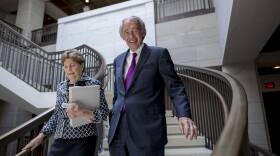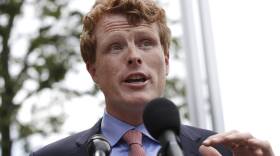EXPLORE MORE
Tuesday on BPR, live from the BPL:
CNN’s John King
Sports authority Trenni Casey
Tufts food policy analyst Corby Kummer
Immigration lawyer Mahsa Khanbabai
Ask the Mayor with Michelle Wu, 1-2pm
Recent segments
-
-
America's Abortion Rate Is At Its Lowest Ever
A new report connects increased access to contraception with decreased abortion rates. -
Emily Rooney On The Upcoming Massachusetts Senate Race
The Democratic party might not be thrilled about Kennedy's challenge to Markey, but Rooney thinks it's good for democracy. -
'Crazy Horse' Monument An 'Insult' To Native Americans, Says Alex Beam
The true intention behind the monument to Crazy Horse is monetary, not reverential, says Beam. -
'Now Or Never' For Kennedy To Run For Senate, Says Chuck Todd
Rep. Joe Kennedy is expected to announce his challenge against Sen. Ed Markey this Saturday. -
Ask The Governor: 09/19/19
On Sept. 19, 2019 Gov. Charlie Baker joined Boston Public Radio for another edition of "Ask the Governor."
Listen to previous shows
-

BPR Full Show 1/8/21: Freedom of Tweets?
Today on Boston Public Radio: Rep. Ayanna Pressley discusses House plans to bring forward articles of impeachment against President Trump next week, following Wednesday’s riot. She also reflects on what it was like being in the Capitol during the storming, and spoke about Boston City Council President Kim Janey potentially becoming both Boston’s first Black mayor, and its first woman mayor. We open lines to callers, to discuss whether President Trump ought to be removed from office follow Wednesday's storming of the U.S. Capitol, and if it’s worth it in his final 12 days as president. Emily Rooney talks about President-elect Biden's choice of Boston Mayor Walsh for U.S. Labor Secretary, and the open question of who’ll win next year’s mayoral race. She also reads a list of must-see movies to watch in quarantine, and previewed this week's Beat the Press. Ramona Diaz discusses the brutal drug war and assaults on press freedoms by Philippine President Rodrigo Duterte, in a conversation about her new documentary, “A Thousand Cuts.” Rep. Seth Moulton responds to Wednesday’s storming of the U.S. Capitol building, and discusses why he thinks it’s imperative that Congress act to remove President Trump from office in the final days of his term. He also recounts his experience being in the Capitol during the attempted coup. Andy Ihnatko talks about the social media platforms like Twitter and Facebook that've banned or temporarily suspended President Trump in light of his rhetoric around Wednesday’s storming of the Capitol. He also weighs in on debate around what constitutes free speech on social media platforms, and the recent widespread Russian hacking of U.S. cyber infrastructure. Callie Crossley discusses a statement made by former Celtics head coach Doc Rivers, comparing law enforcement’s response to Wednesday’s insurrection to what was seen at Black Lives Matter protests. She also touches on social media's reaction to the death of Ashley Babbitt, who died during Wednesday’s chaos. We close out Friday’s show by returning to listeners, to talk about social media and disinformation in the aftermath of Wednesday’s pro-Trump mob. -

BPR Full Show 1/7/21: It Happened Here
Today on Boston Public Radio: Washington Post op-ed columnist E.J. Dionne responds to Wednesday’s chaos incited by Trump mob in Washington, D.C., and the impact it might have on the future of President Trump’s political influence post-presidency. He also weighs in on President-elect Biden's choice of Merrick Garland, his former college friend, to serve as A.G. Former Pentagon official Rosa Brooks reacts to the storming of the Capitol building by President Trump’s supporters, which she predicted in exercises laid out by her bipartisan Transition Integrity Project. She also offers her thoughts on the path forward for maintaining democratic stability in the U.S. Next, we open lines to talk with listeners about your thoughts on Wednesday’s chaos, and the future of the U.S. post-Trump. Former Suffolk County sheriff and secretary of public safety Andrea Cabral discusses the lawlessness of yesterday’s pro-Trump mob. She also offers her take on the lackluster response from authorities defending the U.S. Capitol building, and compares Wednesday’s police enforcement to what was seen at Black Lives Matter protests throughout 2020. Next, we return to listeners to talk about Wednesday’s storming of the U.S. Capitol building, and the response from political leaders and members of the media. Rep. Bill Keating talks about his experience being barricaded in his office at the Capitol on Wednesday, and the rising number of his colleagues looking to pursue invoking the 25th amendment to remove President Trump from office. We close out Thursday's show by returning to our callers, getting your final impressions (for now) of Wednesday's events. -

BPR Full Show 1/6/21: Coup Coup
Today on Boston Public Radio: M.I.T. economist Jonathan Gruber talks about what an expanded stimulus relief package might look like with Democrats in control of the Senate. He also responds to listener questions about what’s in the latest $900 billion package, passed in December. Next, we open lines to talk with callers about the Republicans challenging President-elect Biden’s win, and get your thought on the legacy of Trumpism in American politics. CNN analyst Juliette Kayyem discusses the state of President-elect Joe Biden’s transition to the White House, and the Trump supporters gathering in Washington to contest Congress’ certification of Biden's Electoral College win on Wednesday. Medical ethicist Art Caplan breaks down the latest news on the distribution of COVID-19 vaccines in the U.S., and questions around who ought to have vaccine priority. Next, we open lines to callers, returning to the discussion about resistance to President-elect Joe Biden’s November win. Angell Animal Medical Center’s Dr. Virginia Sinnott-Stutzman joins us for an inaugural edition of “Ask the Vet,” talking about pet care during the pandemic and responding to listener questions. -

'Worth Taking A Pause For': CNN's Kayyem Reflects on Warnock Senate Win
Speaking on Boston Public Radio Wednesday, CNN analyst Juliette Kayyem took a moment to reflect on Tuesday’s Senate runoff victory for Democrat Raphael Warnock in Georgia. Warnock will join the Senate after serving 15 years as pastor at Atlanta’s Ebenezer Baptist Church, where Martin Luther King Jr. presided as co-pastor throughout the 1960’s. "A man of faith entering politics is rare enough, but the extent to which he views his faith as requiring him to have entered politics at this moment is really something that is worth taking a pause for,” she said, adding “I’ve been really intrigued by that very un-threatening combination of faith and public service… I think a lot of us have grown weary of faith in public service, given what’s been done in the name of religion and religious leaders supporting some pretty bad behavior.” Juliette Kayyem is an analyst for CNN, former assistant secretary at the Department of Homeland Security and faculty chair of the homeland security program at Harvard University’s Kennedy School of Government. -

Art Caplan On Primary Care Physicians Getting Left Out Of Vaccine Distribution
Some primary care physicians are being left out of the first wave of COVID-19 vaccinations, even if they are treating patients with the illness. Medical ethicist Art Caplan told Boston Public Radio on Wednesday the issue is a “snafu” in the distribution plans that routed much of the initial doses to hospitals, and left out doctors with no hospital affiliation. “If you write rules for the states, like the CDC, or the states adopt rules that say give the vaccine first to nursing homes then to healthcare workers, then you’re giving them out at hospitals and nursing homes,” said Caplan. “The reason they’re getting missed even if they have patient populations that have a lot of COVID … it’s just not where they are.”









